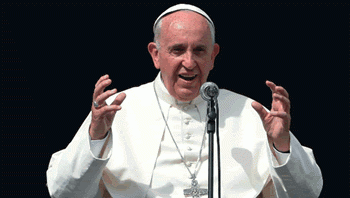In Christ Jesus, we were willed, loved and desired
 None of us can live without love. And an awful slavery into which we can fall is to believe that love is merited. Perhaps a good part of our contemporary anguish stems from this: to believe that if we are not strong, attractive and beautiful, then no one will be concerned with us. … Can you imagine a world where all beg motives to awaken others’ attention, and no one is willing, instead, to freely love another person? Imagine such a world: a world without the gratuitousness of loving! It seems a human world but, in reality, it is a hell.
None of us can live without love. And an awful slavery into which we can fall is to believe that love is merited. Perhaps a good part of our contemporary anguish stems from this: to believe that if we are not strong, attractive and beautiful, then no one will be concerned with us. … Can you imagine a world where all beg motives to awaken others’ attention, and no one is willing, instead, to freely love another person? Imagine such a world: a world without the gratuitousness of loving! It seems a human world but, in reality, it is a hell.
Love ... calls by name
So many of people’s narcissisms are born from a sentiment of solitude and orphanhood. Behind so much apparently inexplicable behaviour there lies the question: is it possible that I do not deserve to be called by name, namely, to be loved? Because love always calls by name.
When an adolescent is not or does not feel loved, then violence can be born. Behind so many forms of social hatred and of hooliganism there is often a heart that has not been recognised. Evil children do not exist, and there are not altogether evil adolescents, but unhappy persons do exist. And what can make us happy if not the experience of love given and received?
God loves because God is love
The first step that God took towards us was that of an anticipating and unconditional love. God loved us first. God does not love us because there is in us some reason that elicits love. God loves us because He Himself is love, and by its nature love tends to diffuse itself, to give itself. God does not even link His benevolence to our conversion: if anything, this is a consequence of God’s love. Saint Paul says it perfectly: ‘God shows His love for us in that while we were yet sinners Christ died for us’ (Romans 5:8). While we were yet sinners, as was the Prodigal Son of the parable: ‘While he was yet at a distance, his father saw him and
had compassion . . .’
(Luke 15:20). Out of love for us God undertook an exodus from Himself, to come to find us in this land where it was senseless that He should walk. God loved us also when we were mistaken.

Photo: The Independent
God’s beloved children
Who of us loves in this way if not one who is father or mother? A mother continues to love her son even when this son is in prison. I remember so many mothers, who were in a queue to enter a prison, in my previous diocese. And they were not ashamed. The son was in prison, but it was their son, and they suffered so many humiliations in the searches before entering, but: ‘It is my son!’ ‘But lady, your son is a delinquent!’ ‘He is my son!’ Only this love of mother and of father makes us understand how God’s love is. A mother does not ask for the cancellation of human justice, because every error calls for a redemption, but a mother never stops suffering for her son. She loves him even when he is a sinner. God does the same thing with us: we are His beloved children! But could it be that God has some children that he does not love? No, we are all loved by God.
God loves us all and always
What is the medicine to change the heart of an unhappy person? What is the medicine to change the heart of a person that is not happy? [They answer: love] Louder! [They shout: love!] Good! Good, all good! And how does one make a person feel that he is loved? It is necessary first of all to embrace him. To make him feel wanted, that he is important, and he will stop being sad. Love calls love, in a stronger way than hatred calls death. Jesus did not die and rise for Himself, but for us, so that our sins would be forgiven. Hence, it is the time of resurrection for all: time to raise the poor from discouragement, especially those lying in a sepulchre for a much longer time than three days. Blowing here, on our faces, is a wind of liberation. Germinating here is the gift of hope. And the hope is that of God the Father who loves us as we are: He loves us all and always.
 Entries(RSS)
Entries(RSS)